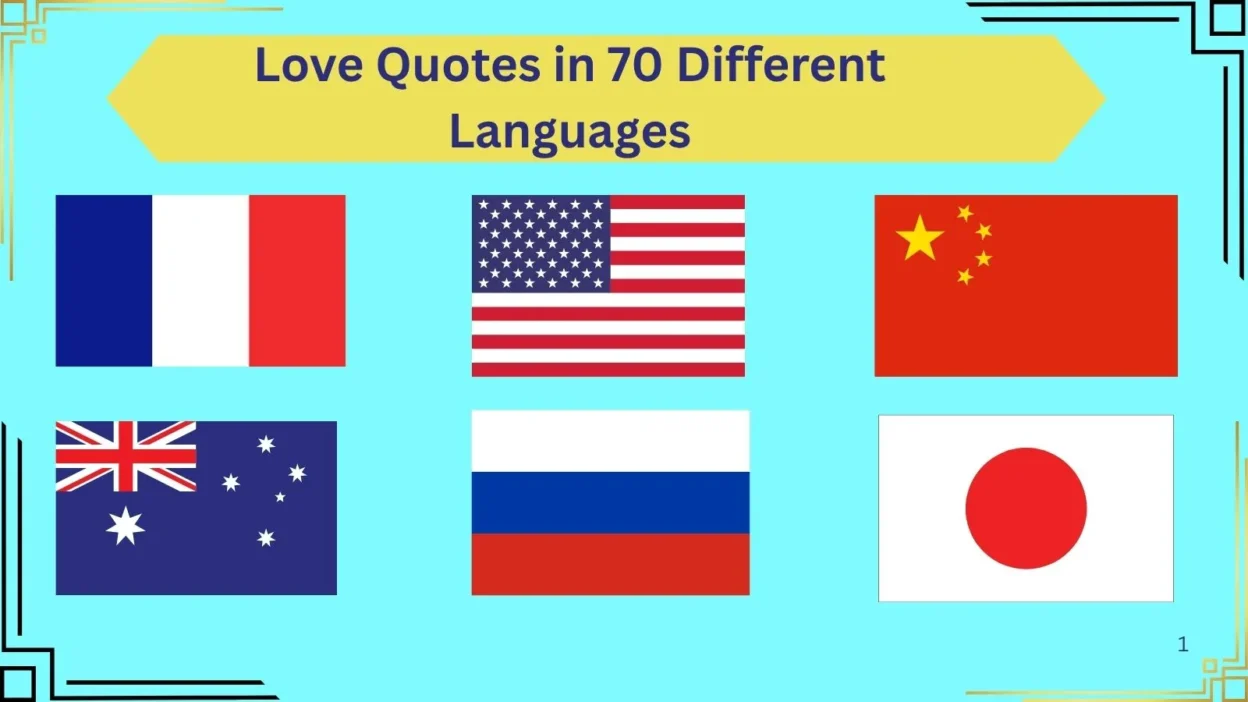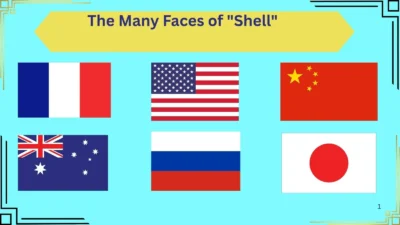If you’ve ever searched for “love quotes,” you’re likely looking for short, meaningful phrases that express feelings of love, affection, or deep emotional connection.
These quotes are often used in messages, social media posts, cards, or personal reflections. For English learners, love quotes can be a helpful way to understand emotional vocabulary and poetic language.
However, some users may struggle with interpreting metaphors or romantic expressions. Exploring love quotes helps you build emotional language skills, understand cultural expressions of love, and express your own feelings more beautifully and clearly.
💖 Love Quotes in 70 Languages
🌎 Europe
- Albanian – “Të dua” (I love you)
- Basque – “Maite zaitut”
- Belarusian – “Я цябе кахаю” (Ya tsyabe kakhayu)
- Bosnian – “Volim te”
- Bulgarian – “Обичам те” (Obicham te)
- Catalan – “T’estimo”
- Croatian – “Volim te”
- Czech – “Miluji tě”
- Danish – “Jeg elsker dig”
- Dutch – “Ik hou van je”
- Estonian – “Ma armastan sind”
- Finnish – “Rakastan sinua”
- French – “Je t’aime”
- Galician – “Ámote”
- German – “Ich liebe dich”
- Greek – “Σ’ αγαπώ” (S’ agapó)
- Hungarian – “Szeretlek”
- Icelandic – “Ég elska þig”
- Irish – “Tá mé i ngrá leat”
- Italian – “Ti amo”
- Latvian – “Es mīlu tevi”
- Lithuanian – “Aš tave myliu”
- Macedonian – “Те сакам” (Te sakam)
- Maltese – “Inħobbok”
- Norwegian – “Jeg elsker deg”
- Polish – “Kocham cię”
- Portuguese – “Amo-te”
- Romanian – “Te iubesc”
- Russian – “Я люблю тебя” (Ya lyublyu tebya)
- Serbian – “Волим те” (Volim te)
- Slovak – “Ľúbim ťa”
- Slovenian – “Ljubim te”
- Spanish – “Te quiero” / “Te amo”
- Swedish – “Jag älskar dig”
- Ukrainian – “Я тебе кохаю” (Ya tebe kokhayu)
- Welsh – “Rwy’n dy garu di”
🌏 Asia
- Arabic – “أحبك” (Uhibbuka – ♂ / Uhibbuki – ♀)
- Armenian – “Ես սիրում եմ քեզ” (Yes sirum em qez)
- Azerbaijani – “Səni sevirəm”
- Bengali – “আমি তোমাকে ভালোবাসি” (Ami tomake bhalobashi)
- Burmese – “မင်းကိုချစ်တယ်” (Mingalaba)
- Chinese (Mandarin) – “我爱你” (Wǒ ài nǐ)
- Filipino (Tagalog) – “Mahal kita”
- Georgian – “მე შენ მიყვარხარ” (Me shen miq’varkhar)
- Hindi – “मैं तुमसे प्यार करता हूँ” (♂) / “मैं तुमसे प्यार करती हूँ” (♀)
- Indonesian – “Aku cinta kamu”
- Japanese – “愛してる” (Aishiteru)
- Kannada – “ನಾನು ನಿನ್ನನ್ನು ಪ್ರೀತಿಸುತ್ತೇನೆ” (Nānu ninnannu prītisuttēne)
- Kazakh – “Мен сені жақсы көремін” (Men seni jaqsı köremin)
- Khmer – “ខ្ញុំស្រលាញ់អ្នក” (Khnhom sralanh anak)
- Korean – “사랑해” (Saranghae)
- Kurdish – “Ez te hez dikim”
- Malayalam – “ഞാൻ നിന്നെ സ്നേഹിക്കുന്നു” (Njan ninne snehikkunnu)
- Nepali – “म तिमीलाई माया गर्छु” (Ma timilai maya garchu)
- Persian (Farsi) – “دوستت دارم” (Dooset daram)
- Punjabi – “ਮੈਂ ਤੁਹਾਨੂੰ ਪਿਆਰ ਕਰਦਾ ਹਾਂ” (♂) / “ਮੈਂ ਤੁਹਾਨੂੰ ਪਿਆਰ ਕਰਦੀ ਹਾਂ” (♀)
- Sinhala – “මම ඔයාට ආදරෙයි” (Mama oyāṭa ādareyi)
- Tamil – “நான் உன்னை காதலிக்கிறேன்” (Naan unnai kaadhalikiren)
- Telugu – “నేను నిన్ను ప్రేమిస్తున్నాను” (Nenu ninnu premistunnanu)
- Thai – “ฉันรักคุณ” (Chan rak khun)
- Turkish – “Seni seviyorum”
- Urdu – “میں تم سے پیار کرتا ہوں” (♂) / “میں تم سے پیار کرتی ہوں” (♀)
- Uzbek – “Men seni sevaman”
- Vietnamese – “Anh yêu em” (♂ to ♀) / “Em yêu anh” (♀ to ♀)
🌍 Africa
- Afrikaans – “Ek het jou lief”
- Amharic – “እወድሃለሁ” (Ewedihalehu)
- Hausa – “Ina son ku”
- Swahili – “Nakupenda”
- Yoruba – “Mo nifẹ rẹ”
- Zulu – “Ngiyakuthanda”
💞 Conclusion
Love transcends borders, yet each language adds its own cultural nuance. Some languages (like Spanish) have two ways (Te quiero for affection, Te amo for deep love), while others (like Japanese) reserve “Aishiteru” for serious commitments.
Analysis
- Most Common Root: Many European languages stem from Latin (Amo → Ti amo, Te amo).
- Shortest: “Te” (Spanish), “Saranghae” (Korean).
- Longest: “Nānu ninnannu prītisuttēne” (Kannada).
- Most Poetic: Irish (“Tá mé i ngrá leat” = “I am in love with you”).
- Gender Variations: Hindi, Punjabi, Urdu, and others change based on the speaker’s gender.
Love is universal, but its expression is beautifully diverse. ❤️
Meaning, Usage, and Why You’re Searching for It ❤️
Meta Description:
Discover the true meaning of love, why people search for it, and how to use this powerful word in everyday life. An informative guide for deeper understanding and better relationships.
Why Are You Searching for “Love”?
If you’ve searched for the word “love,” you’re likely looking for more than just a dictionary definition. You might be navigating a relationship, wondering what your feelings mean, or simply trying to understand how to express affection better.
Love is one of the most powerful and complex human emotions. People look for it in family, friendship, romance, and even in self-growth. Whether you’re feeling confused, inspired, or just curious, you’re in the right place.
This article helps solve that emotional curiosity by breaking down the meaning, types, and everyday use of the word love, so you can better express and recognize it in your life.
What Does “Love” Really Mean?
Love is both a noun and a verb, which makes it incredibly versatile. At its core, love is a deep feeling of affection, care, and connection. But the meaning can shift depending on context:
- Romantic Love – A strong emotional and physical attraction toward another person.
- Familial Love – Unconditional support and bond between parents, children, and siblings.
- Friendship Love – Trust and mutual care between friends.
- Self-Love – Respecting and valuing oneself.
- Universal Love – Compassion for humanity, animals, or the universe.
Why Is Understanding Love Important?
People search for love because it’s a basic human need. Knowing what love is and how to express it can:
- Improve relationships
- Enhance emotional intelligence
- Prevent misunderstandings
- Promote mental well-being
- Lead to a more meaningful life
How to Use the Word “Love” in Conversations
Here are simple, real-life ways to use the word love across different situations:
- Romantic:
“I love you more every day.” - Friendship:
“I love spending time with you.” - Family:
“I love how close we’ve become as a family.” - Hobbies/Interests:
“I love painting in my free time.” - Food/Things:
“I love this chocolate cake!” - Self-Love:
“I’m learning to love myself.” - Support:
“Sending love and prayers your way.” - Care for Others:
“She has so much love for animals.” - Gratitude:
“Thanks for the love and support.” - Social Media:
“Love this post!”
Tips on Talking About Love
- Be honest – Say it only when you mean it.
- Be clear – Don’t mix love with dependency or obsession.
- Be respectful – Everyone expresses and receives love differently (love languages).
- Be brave – Expressing love takes courage, especially in tough times.
Love in Different Languages (Bonus)
Want to express love in a global way? Here’s how to say love in different languages:
- Spanish: Amor
- French: Amour
- German: Liebe
- Arabic: حب (Hubb)
- Hindi: प्यार (Pyar)
- Japanese: 愛 (Ai)
- Korean: 사랑 (Sarang)
- Chinese: 爱 (Ài)
- Italian: Amore
- Urdu: محبت (Mohabbat)



